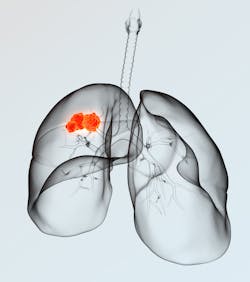In a new study, Yale Cancer Center researchers at Yale School of Medicine discovered that patients with stage III non-small cell lung cancer (NSCLC) and an EGFR genetic mutation had improved survival outcomes with epidermal growth factor receptor tyrosine kinase inhibitors (EGFR TKIs) after being treated with chemoradiation, compared to durvalumab. EGFR TKIs are targeted therapies that block certain proteins that help cancer cells grow and spread.
Researchers analyzed data from 22 medical institutions, where patients with stage III NSCLC were treated between 2015 and 2022. Out of the 89 patients with the EGFR genetic mutation, those who received chemoradiation followed by EGFR TKI therapy lived longer, compared to those who received durvalumab after chemoradiation, or patients who had no additional treatment. 86% of patients treated with chemotherapy and radiation followed by EGFR TKI therapy lived at least two years longer without recurrence. This disease-free survival rate was much higher than the chemoradiation-durvalumab combination treatment (38%), or no treatment after chemotherapy and radiation (29%).
About half of the patients experienced negative side effects from both EGFR TKIs and durvalumab, following chemotherapy and radiation. However, patients rarely had severe side effects.

